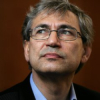Orhan Pamuk

Orhan Pamuk
Ferit Orhan Pamukis a Turkish novelist, screenwriter, academic and recipient of the 2006 Nobel Prize in Literature. One of Turkey's most prominent novelists, his work has sold over thirteen million books in sixty-three languages, making him the country's best-selling writer...
ProfessionNovelist
Date of Birth7 June 1952
CityIstanbul, Turkey
attachment civilization collecting essential human inventing museums pedestal power western
The habit of collecting, of attachment to things, is an essential human trait. But Western civilization put collecting on a pedestal by inventing museums. Museums are about representing power. It could be the king's power or, later, people's power.
anarchic came combine cultural east fact means mix search testimony west work
Culture is mix. Culture means a mix of things from other sources. And my town, Istanbul, was this kind of mix. Istanbul, in fact, and my work, is a testimony to the fact that East and West combine cultural gracefully, or sometimes in an anarchic way, came together, and that is what we should search for.
exhibit government images inventions museums powerful signs state symbol tend western
Museums are western inventions where the rich and the powerful or the government and the state tend to exhibit the signs and symbol and images of their culture.
focusing novels telling western
I had the feeling that focusing on objects and telling a story through them would make my protagonists different from those in Western novels - more real, more quintessentially of Istanbul.
europe hands west
Well, on the one hand the Turks have the legitimate need to defend their national dignity - and this includes being recognized as a part of the west and Europe.
crime
There is nothing that constitutes a crime in this interview.
american-novelist elections figured hope improve point policy voters win
At some point they figured out that you can win elections with a pro-European policy because the voters hope this will improve their lives.
almost armenians million talks
Thirty-thousand Kurds were killed here, 1 million Armenians as well. And almost no one talks about it, ... Therefore, I do.
armenians dares lands million nobody talk
Thirty-thousand Kurds and one million Armenians were killed in these lands and nobody but me dares to talk about it,
armenians dares lands million nobody talk thirty thousand
Thirty thousand Kurds and 1 million Armenians were killed in these lands and nobody but me dares to talk about it,
case character competing course define europe france ideas itself joining needs past policy reason recommend reduced simple since solve term turkey ultimately various view vision
Of course I'm for Turkey joining the EU. But it's too simple to say that will make us all well-off and solve all our problems. Since the referendums in France and the Netherlands, Europe is preoccupied with itself. Various ideas are competing with one another about the character of the Union. Will Europe define itself exclusively through the past ? This is a conservative view and can ultimately be reduced to discussions on agricultural policy and the distribution of funds. This is always the case with short-term politics. But in the long term Europe needs an all-encompassing vision of itself and for that reason I recommend that Turkey joins.
lived political reason turkey
I am a Turk. I've lived in Turkey for 43 years, and for that reason my political observations are about Turkey, because that's what I know.
attacks attitude avoid beginning blame clear draw eye incidents including lack line members problem tried wave weakness year
I blame him for his weakness and lack of determination. At the beginning of this year we had a wave of nationalist incidents and attacks on the E.U. project, including some by members of his own party. He did not look the problem in the eye and draw a clear line between anti-E.U. nationalism and the attitude of tolerance. He tried to avoid the subject.
believe changes cosmetic country drag enter feet freedom full minority respect
For a country to enter the EU, there has to be full respect of minority rights, freedom of thought and expression. If you drag your feet and make cosmetic changes ... then this won't do. To believe that, you would need to be a child.